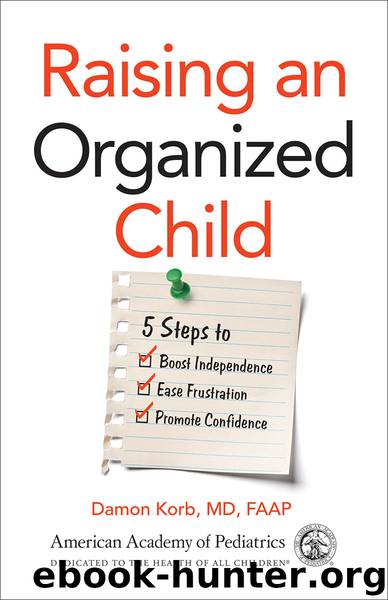Raising an Organized Child by Damon Korb

Author:Damon Korb
Language: eng
Format: epub
Publisher: American Academy of Pediatrics
Published: 2019-06-28T16:00:00+00:00
Step 1: Be consistent
A school-aged child’s growing ability to be persistent and her emerging use of logic can make it even more difficult for parents to respond consistently to their child. School-aged students can get very good at manipulating their parents by either outsmarting them or wearing them down. Your child will point out, for instance, that there are many logical reasons why she should stay up past her bedtime (eg, homework, a special television show, an out-of-town guest, not yet finished with a video game, want to spend more time with Mom and Dad). Yet, each time parents waver, and do not stay consistent on established rules such as bedtime, they damage their credibility. And like an elephant, the school-aged child never ever forgets. She will remember the last time you made an exception and remind you of it, time and time again, to try to work toward what she wants (eg, “But you let me play video games after school last week”).
Parents of school-aged children need to be careful to avoid getting caught up in any schemes and arguments of their school-aged child. The way to do this is to always consider the big picture. The big picture is the rule that applies or the lesson that the parent is trying to enforce or teach. For instance, in the case of a bedtime, the big picture is that children need 8½ to 11 hours of sleep per night in order to grow and be healthy. Because each breach of the rule will make future enforcement more difficult, only the most important circumstances should be considered. It becomes easier to avoid future arguments when the big picture is consistently reinforced. When school-aged children get an answer that they do not want, they will often ask again and again. Parents should not engage in this debate but, instead, should refer to the big picture, “Children your age need sleep to be healthy.” If your child has nobody to argue with, he quickly learns that arguing does not work.
At this age, your child will likely make unsafe choices when unsupervised. Therefore, parents need to continue close supervision and limit setting. A school-aged child wants to do many things that he is not old and mature enough to handle, and it is up to parents to establish clear boundaries. Staying up late is just one of them, but there are many, including watching sexually explicit movies, playing violent video games, eating junk food, and riding in the front seat of the car when he is too small, to name just a few. When you say no to allowing your child to participate in these activities that target a mature audience, what you are really saying is “No, because I care about you.”
Parents can gradually introduce their children to more freedom and responsibility by allowing them to pursue their interests. A school-aged child will have many things on her plate, such as soccer practices, clubs at school, homework, friends, chores, and family obligations,
Download
This site does not store any files on its server. We only index and link to content provided by other sites. Please contact the content providers to delete copyright contents if any and email us, we'll remove relevant links or contents immediately.
| Disabilities | Hyperactivity |
The Out-of-Sync Child by Carol Stock Kranowitz(2039)
The Gender Creative Child by Diane Ehrensaft & Norman Spack(1783)
Aspergirls by Rudy Simone(1696)
Your Soul's Plan by Robert Schwartz(1677)
Be Different by John Elder Robison(1646)
My Child's Different by Elaine Halligan(1511)
101 Tips for the Parents of Boys with Autism by Ken Siri(1478)
Meditation: Meditation For Beginners - How to Meditate For Lifelong Peace, Focus and Happiness (Mindfulness, Meditation Techniques) by Price Sara Elliott(1432)
The Sensory Child Gets Organized by Carolyn Dalgliesh(1430)
Asperger Syndrome (Autism Spectrum Disorder) and Long-Term Relationships by Ashley Stanford(1418)
ADHD by Mark Selikowitz(1390)
An Adult with an Autism Diagnosis by Gillan Drew(1340)
Nerdy, Shy, and Socially Inappropriate by Cynthia Kim(1337)
Animal-assisted Interventions for Individuals with Autism by Temple Grandin(1320)
The Yoga Bible by Christina Brown(1320)
Seeing Ezra by Kerry Cohen(1304)
Somebody Else's Kids by Torey Hayden(1262)
Baby Signing for Dummies by Jennifer Watson(1258)
The Complete Guide to Asperger's Syndrome by Tony Attwood(1230)
